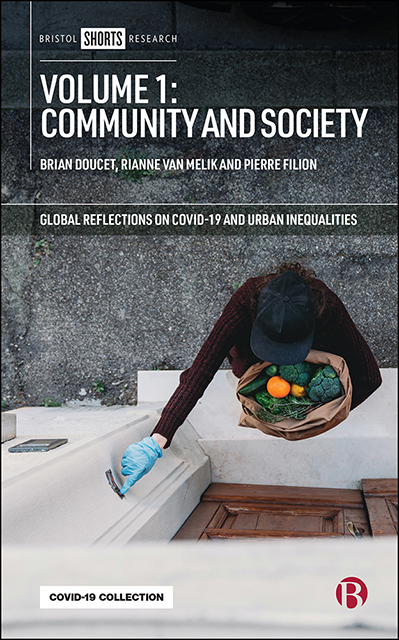Book contents
- Frontmatter
- Contents
- List of Figures and Tables
- Notes on Contributors
- Acknowledgments
- Preface to All Four Volumes of Global Reflections on COVID-19 and Urban Inequalities
- One Introduction
- Part I Working Practices
- Part II Life During Lockdown
- Part III Migration, Migrants, and Refugees
- Part IV Age, Race, Gender, and Ability
- Index
Ten - Infrastructure Inequality and Privileged Capacity to Transform Everyday Life in COVID-19 South Africa
Published online by Cambridge University Press: 13 April 2023
- Frontmatter
- Contents
- List of Figures and Tables
- Notes on Contributors
- Acknowledgments
- Preface to All Four Volumes of Global Reflections on COVID-19 and Urban Inequalities
- One Introduction
- Part I Working Practices
- Part II Life During Lockdown
- Part III Migration, Migrants, and Refugees
- Part IV Age, Race, Gender, and Ability
- Index
Summary
Introduction
This chapter, written in the midst of the ongoing COVID-19 pandemic, responds directly to its potential to deepen existing inequalities. Using the example of South Africa, we highlight how COVID-19 exacerbates existing inequalities in access to infrastructure. This chapter was initially written in April 2020 (with minor updates in September 2020), in the early stages of South Africa's lockdown response to the global pandemic. The chapter has two core arguments; first, that human capacity to adhere to public health advice is privileged; and second, that global public health advice requires local contextualization.
Since December 2019 the COVID-19 virus has spread rapidly around the world, causing human fatalities, destabilizing economies, and severely restricting population movement through lockdown, social distancing, and travel restrictions. While the virus's origins are presently traced to China, this is inherently a global virus; not merely in terms of epidemiological geographic spread, but also the impacts across the world's social, political, and economic landscapes. However, as this chapter demonstrates, those impacts are unevenly distributed, not just between countries with differing capacity to provide, for example, health care and socio-economic support packages, but also within countries, where pre-existing inequalities are accentuated by public health advice framed by Euro-Asian contexts.
Specifically, global approaches that are directed by what is feasible in high-income countries with strong governments overlook significant divergences in the global capacity of governments, the physical and financial infrastructure of societies, alongside inequalities in citizens’ ability to follow government advice to keep themselves ‘safe’. This chapter identifies inequalities in the capacity of South Africa's population to comply with lockdowns and social distancing requirements, and demonstrates how COVID-19 highlights and exacerbates existing inequalities.
A global virus in the Global South
COVID-19 is a global virus, but the impact is uneven. Because it was initially concentrated in Asia, Europe, and the US, global public health responses are heavily informed by the societal structures and lifestyles of countries with high incomes and tax bases (for example Western Europe, US, Singapore) and where extreme state surveillance is common (for example China, South Korea). Globally, two non-pharmaceutical interventions have been implemented to reduce transmission rates: mitigation, and suppression. Mitigation aims to slow the epidemic's spread, for example through temporary lockdowns, including closing schools, cafés/restaurants, and other non-essential businesses.
- Type
- Chapter
- Information
- Volume 1: Community and Society , pp. 105 - 116Publisher: Bristol University PressPrint publication year: 2021

